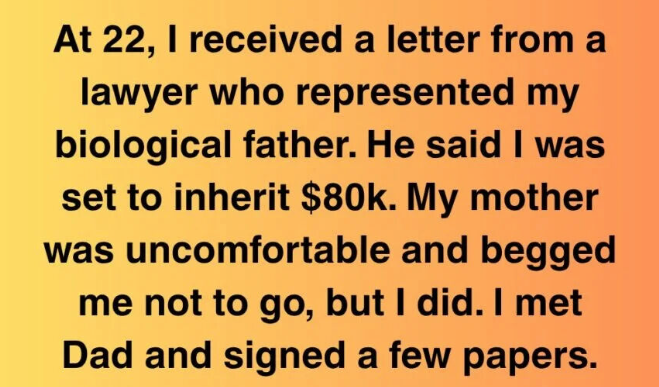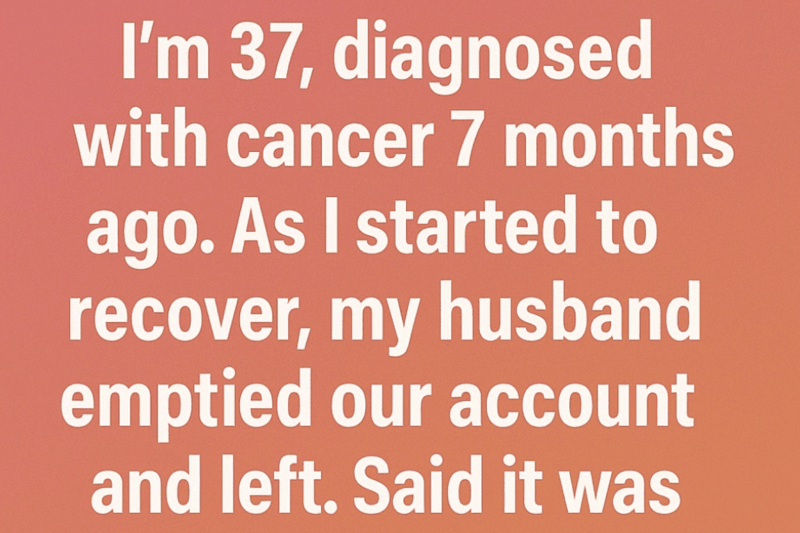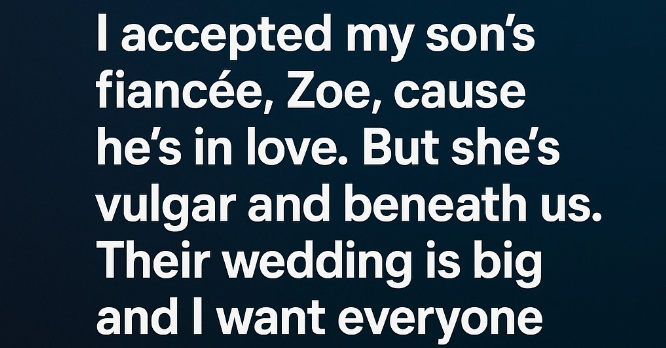At 22, a letter arrived from Gideon Lowry, a lawyer representing my biological father, Calvin Okoro. It stated I was to inherit $80,000. My mother, Zainab, felt uneasy and urged me to stay away, but curiosity drew me in.
I met Calvin and completed the necessary paperwork. Over the next two years, we grew close. Then, a sudden call from Gideon broke the news: Calvin had died of a heart attack at 63. The lawyer insisted we meet again, urgently. A heavy feeling settled in my chest as I ended the call.
I couldn’t pinpoint why. Perhaps because I’d only recently begun to trust Calvin, and now he was gone. Or maybe because Zainab’s warnings echoed in my mind.
Let me backtrack. Growing up, I knew little about my father. Zainab, who raised me single-handedly while balancing two jobs, always said he wasn’t worth knowing. “Some men create children, not families,” she’d say when I pressed for details. She managed bills with finesse and devoted herself to my upbringing. When Gideon’s letter arrived, mentioning Calvin’s financial bequest, Zainab’s expression darkened. With quiet sorrow, she cautioned, “Don’t fall for his allure. Nothing with him is ever straightforward.”
Still, I went to meet him.
My curiosity outweighed my caution. We met at a cozy diner near Asheville. Calvin, dressed in a loose gray sweater, brought a photo of me as a toddler—its origin a mystery. He admitted, “I messed up. I’ve been waiting for the right moment to connect. I want to know you, Muna, if you’ll allow it.”
I signed the papers for the $80,000, which came from a savings account he’d maintained in my name since my birth. It felt unusual, but I didn’t probe further. Over two years, we built a bond through dinners, hikes, and long phone calls. He shared tales of his days as a jazz musician and a near-marriage to a Spanish opera singer. His stories made me laugh, then moved me with his regret. It felt like a missing piece of my life had finally clicked into place. Then, abruptly, he was gone.
At Gideon’s office, he handed me a heavy envelope containing a handwritten letter and an “Addendum to Will.” Calvin’s letter read: “If you’re reading this, I’m sorry we didn’t have more time. You’re the best thing I ever did. I never deserved Zainab, and I likely don’t deserve your forgiveness. But I left you more than money, Muna. I left you a chance to do what I couldn’t—make things right.”
The addendum revealed more. Beyond the $80,000, Calvin named me the sole executor of a property, The Haven House, a rundown boarding house in rural North Carolina he once co-owned with his sister, Aunt Folami, whom I’d never met. It housed six tenants and came with a condition: I couldn’t sell it for five years. I had to either restore it and keep it operational or forfeit the inheritance. Stunned, I realized this wasn’t the simple windfall I’d expected—it was a challenge.
I visited The Haven House that week. The building sagged like a weary elder, its porch steps creaking and paint peeling in strips. A wind chime clinked like shattered glass. Inside, the tenants eyed me warily, like a new authority figure. There was Mr. Terry, a retired carpenter who sipped Ovaltine and fed stray cats; Maribel, a woman in her 40s with a limp, running an online jewelry business rent-free thanks to Calvin; and Harlan, a quiet man who played saxophone from his window each afternoon. The air smelled of wood rot and artificial freshness. I wondered what I’d gotten myself into.
Logic suggested I walk away, take the $80,000, and move on. But Maribel’s tearful words stopped me: “Calvin was imperfect, but he gave people chances when no one else would. This place is all some of us have.”
So, I stayed, initially to evaluate. One week became two. I helped Maribel improve her Etsy store and fixed Harlan’s leaky faucet using online tutorials. I spent $2,000 of the inheritance on plumbing repairs, then $5,000 on pest control. The house demanded constant investment, but a stubborn resolve grew in me. It wasn’t about Calvin anymore—it was about creating something enduring.
In Calvin’s desk, I found old letters revealing Zainab had reached out when I was six, seeking help with school fees. He never responded. That discovery stripped away my idealized view of him. He was flawed, even cowardly, in many ways. Yet, maintaining The Haven House felt like his attempt at atonement.
Seven months in, a letter arrived—not from a bill collector, but from Aunt Folami. She’d been in Ghana with an NGO and learned of Calvin’s death. She wanted to reclaim the house, claiming Calvin had promised to return it to her after his failed tenant management. We met at the property. Tall and silver-haired, she surveyed the house and remarked, “He always sought redemption in complicated ways.”
When I asked her plans, she replied, “Sell it. Split the proceeds. It’s no longer a home—just a burden.”
But it was a home—to the tenants, to me. I refused, backed by the legal authority of the will. Folami didn’t argue loudly. She simply said, “You’re more like him than you realize,” and left.
That night, I wept—not from fear, but from understanding the solitary battles Zainab must have faced. Still, I pressed on. I secured a local historic grant and enlisted college volunteers. Harlan taught saxophone to local kids in exchange for painting help. By month ten, The Haven House felt vibrant, not perfect, but alive.
Then, a local journalist published a piece titled “The Daughter Who Came Back.” It spread widely, drawing donations and even free roofing from someone whose uncle had lived there decades ago. Folami returned, this time with tea, and sat with me on the porch. “I was mistaken,” she admitted. “You didn’t inherit a problem—you inherited his unfinished vision.”
She gave me a velvet pouch containing a brass key and a note: “For the attic. Some things are better passed on than forgotten.” The attic held Calvin’s notebooks, tapes, and a binder labeled “Second Chances Project.” He’d envisioned The Haven House as a haven for ex-convicts and single parents rebuilding their lives. He hadn’t succeeded, but I could.
With grants, city support, and Folami’s legal waiver, we transformed The Haven House into a transitional living home within 18 months. Today, it houses eight residents, boasts a garden, and hosts weekly community dinners. I sometimes wish I’d had a father who stayed, who didn’t leave guilt as his legacy. But I’m proud of what the $80,000 sparked. It wasn’t about the money—it was about choosing to stay, to build, to forgive, and to transform broken things into something meaningful.
If this story moved you, consider sharing it. You never know who’s standing at their own crossroads, deciding whether to walk away or step forward.




